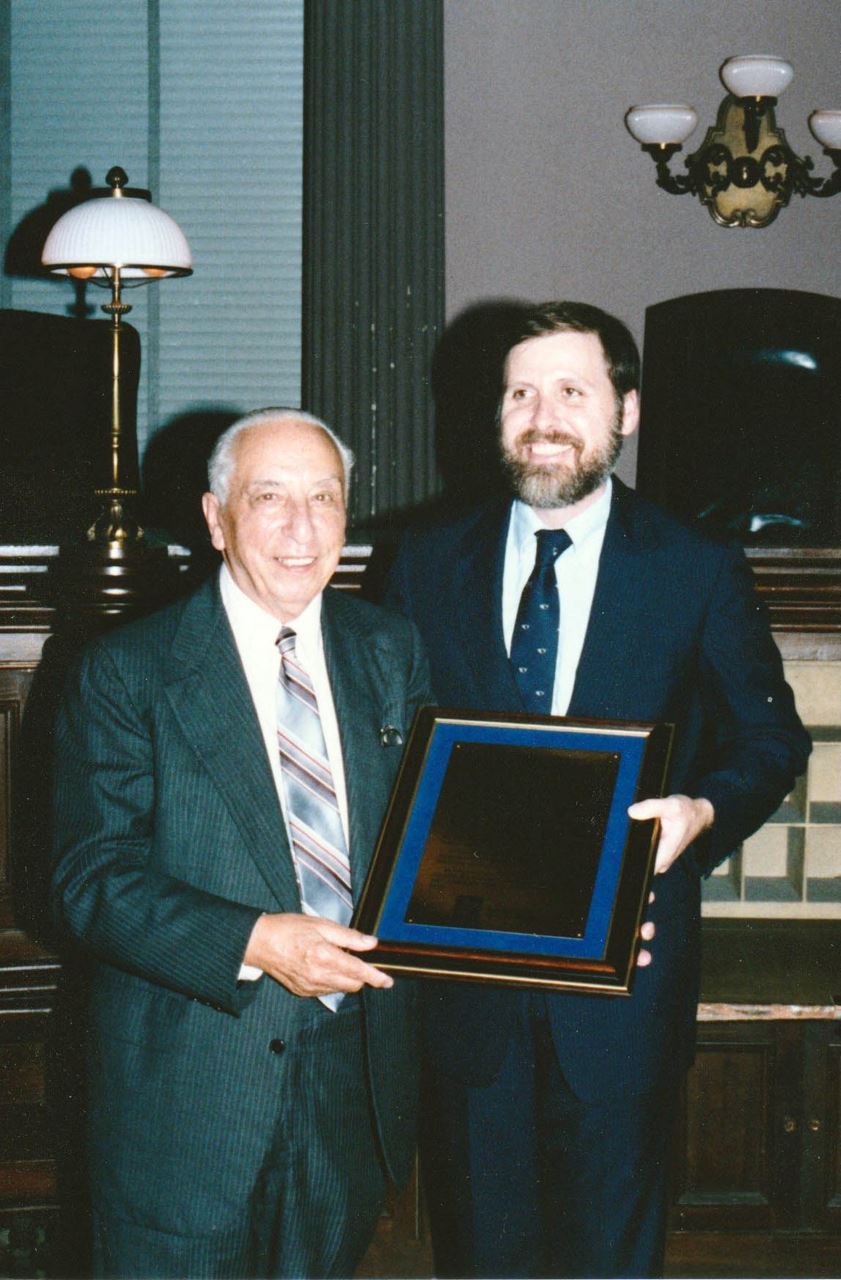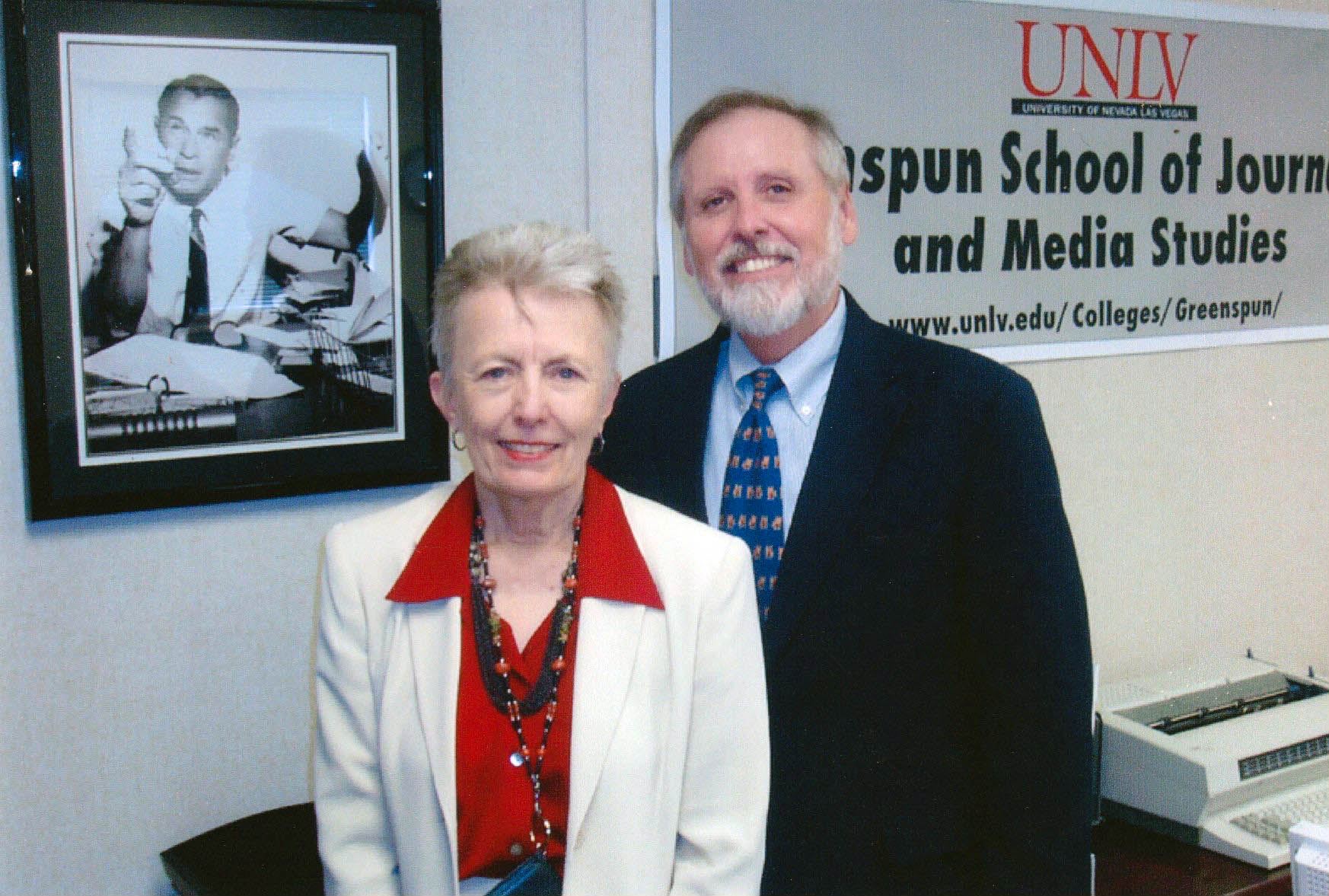How did you get involved in AJHA? 
I learned about the formation of AJHA from its founder, David Sloan, attending the organization's first meeting at Southern Methodist University in Dallas and meeting some outstanding scholars who became life-long friends, including David, Maurine Beasley and Sidney Kobre.
Since my primary interest was in the history of broadcast news, I thought that I might be able to learn more about the print side of things from this organization and its people. In a "second wave" of development other outstanding scholars emerged in that specialty: Mike Conway, Dale Cressman, Tom Mascaro, Maddie Liseblad and Jon Marshall -- just to name a few. They have been extremely helpful to me and one another. Over the years, we've formed a professional family of scholars.
How did you contribute to AJHA's early development?
Serving on the inaugural Board of Directors, as a "cheerleader" in establishing our journal, "American Journalism," and hosting an early meeting in St. Louis, I met many early contributors. After serving a term as president, I also hosted a board meeting when we decided to revise the organization's very early by-laws.
Who are some people from AJHA who had the biggest impact on you -- including your research?
Sid Kobre, whose extensive work I reviewed and discussed with him, and David Sloan, who recruited me to the organization and asked me to contribute to one of his many history projects. Of course, this is what David did for many of the organization's early contributors as well as his former Ph.D. students. I've thanked him and even his wife Joanne many times for involving me in all this. The first draft of a chapter I put together for David turned into an early book of mine, "The Political Performers." This book was followed by several more with contributions from members like Don Godfrey, Mary Beadle, Roy Moore, Maurine Beasley, Bernell Tripp, Peggy Blanchard, Fred Blevens, Kathy Bradshaw, David Copeland, Erika Engstrom, Elliott King and Kim Voss. All are AJHA devotees and friends.
Who were some of the other early members who worked with you in areas beyond research?

AJHA has always been blessed with very talented and dedicated leaders. I'm thinking now of people like Carol Sue Humphrey, Wally Eberhardt, Therese Lueck, Erika Pribanic-Smith and David Vergobbi. I’ve worked on a large number of collaborative projects with many AJHA members. Interaction with AJHA members helped me to remain active in writing and publishing. They also, on occasion, provided some sorely needed perspective. Jim Startt had been years in the academy before we met and he helped me navigate some tricky waters in advancing various academic initiatives and new degree programs. Barbara Cloud was also a major influence in that regard. Barbara hosted an early AJHA meeting held in Las Vegas and introduced me to Hank Greenspun, the Nevada publisher who became a key benefactor and namesake of University of Nevada-Las Vegas' Journalism School. I followed Barbara in office as AJHA president.
I was able to join Barbara, Greg Borchard, Tony Ferri and Larry Mullen, plus the rest of UNLV's journalism faculty in getting that new school started and well-underway before returning back to our home base in Missouri. In the years following that assignment, professors from my previous schools, including the late Sam Riley of Virginia Tech and John Ferre, now retired from University of Louisville, were making solid contributions to the organization—and our field—and so I was grateful when they would sometimes credit me for having involved them. I don't get to attend many national meetings these days but I do get a genuine kick out of it when I look over an on-line conference schedule for AJHA and notice some current names like Stephen Bates of UNLV or Cayce Myers from Virginia Tech.
Betty Winfield was also a great help to me -- and on many occasions. Some of our more senior members might remember that AJHA worked on the initiative to get a U.S. Postage Stamp established to honor Edward R. Murrow. We hosted a "First Day of Issue" ceremony in St. Louis and Betty was kind enough to drive in from Columbia to give a talk about Ed's radio broadcasts. She also helped me out when I was honored with a Goldsmith Award for a book I mentioned earlier, "The Political Performers." Betty even took a photo of me with Mrs. Murrow on that occasion and whenever anyone asked me if I ever met Ed Murrow, I could stop responding: "No, he passed away when I was in high school," to now boast instead: "But I did have dinner and screen some broadcasts with his wife Janet -- at Harvard."
What are your interests outside of academia?
I am now in "Governor Emeritus" mode with the National Academy of Television Arts and Sciences here in the Midwest, so I stay in-touch by assuming some EMMY judging chores. We also support a major bicycle race here thru an organization called "Forest Park Forever." But my one guilty pleasure is being a total basketball nut. During that season, I become obsessed. In fact, my family likes to say that all the teaching assignments I have held were based on college basketball rankings. That's not TOTALLY true—in spite of some administrative positions I held in Kentucky and UNLV.
Louisville men's basketball has fallen on hard times lately but the last thing I heard from that University was an inquiry from John Ferre and the President's Office there when the University was responding to media inquiries regarding the confirmation of the CIA Director, Gina Haspel. It turned out that when I got U of L's academic program established and its bachelor's degree approved back in 1976, Gina was one of many students who transferred from the University of Kentucky to the University of Louisville. She attended UK for a few years and was able to transfer and graduate from U of L in 1978. Louisville's development office wanted to know if I remembered Gina when she was still a student there? I said something like: "Recalling that it's been over forty years—unless she played basketball or appeared on the cover of 'Sports Illustrated,' probably not." What can you say? Right, I'm a hopeless case.
Michael D. Murray is a Board of Curator’s Distinguished Teaching Professor at the University of Missouri--St. Louis. He served as national president the American Journalism Historian’s Association and received the organization’s highest honor, its Lifetime Achievement (the Sidney Kobre Award), as well as the highest recognition by the Broadcast Education Association, the Distinguished Service to Education Award. He was inducted into the National Academy of Television Arts & Sciences’ honorary society, Silver Circle.

